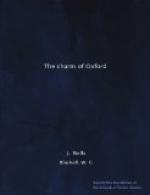“Beautiful city! so venerable, so lovely, so unravaged by the fierce intellectual life of our century, so serene!
‘There are our young barbarians, all at play.’
And yet, steeped in sentiment as she lies, spreading her gardens to the moonlight, and whispering’ from her towers the last enchantments of the Middle Ages, who will deny that Oxford, by her ineffable charm, keeps ever calling us nearer to the true goal of all of us, to the ideal, to perfection—to beauty, in a word, which is only truth seen from another side?”
But this is not the real intellectual charm of Oxford, which has been ever the centre of strenuous life, rather than of dilettante dreamings. From the very beginning, she has been a city of “Movements.” Some visitors, then, will come to Oxford as the home and the burial-place of Roger Bacon, representing as he does the Franciscan Order, with its Christ-like sympathy for the poor and its early attempts to develop the knowledge of Natural Science; Oxford was in the thirteenth century the great centre of the Friars’ movement in England. Others will remember that in the next century it produced, in John Wycliffe, the great opponent of the Friars, the man who, as the first of the Reformers, is to many the most interesting figure in mediaeval English religious history. In the sixteenth century, Oxford plays no great part in the actual revolution in the English Church; yet it will be a place attractive to many who cherish the memory of the “Oxford Reformers,” the members of Erasmus’ circle —John Colet, Thomas More, William Grocyn, and other scholars—who hoped by sound learning to amend the Church without violent change. Some, on the other hand, will see in the sixteenth-century Oxford, the school which trained men for the Counter-Reformation, such as the heroic Jesuit, Campion, or Cardinal Alien, the founder of the English College at Douai. The Anglican “Via Media” found its special representatives in Oxford in Jewel and Hooker, and in Laud, the practical genius who carried out its principles in the Church




